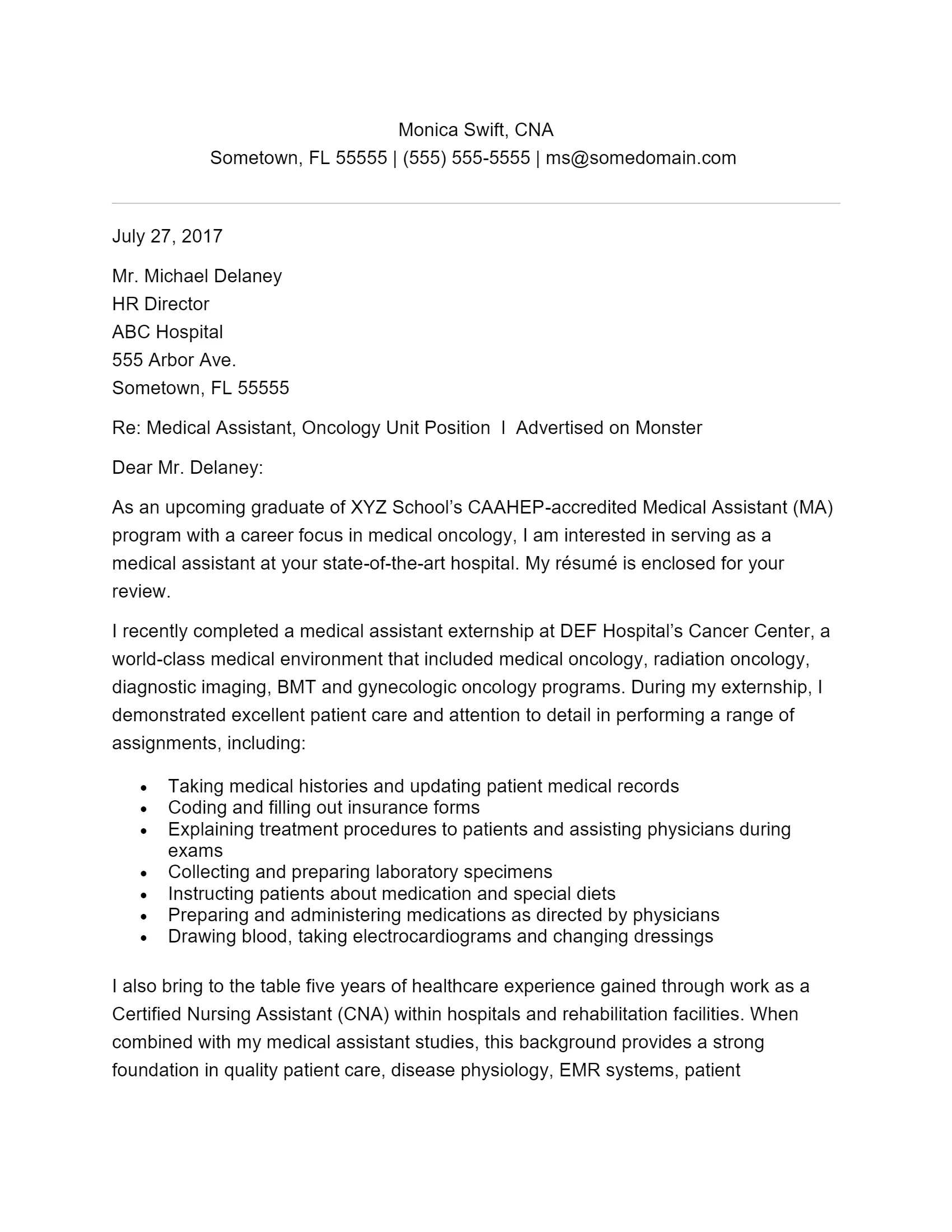Crafting a Medical Assistant Cover Letter
A well-crafted cover letter is your introduction to a potential employer and a crucial part of the job application process. For aspiring medical assistants with no prior experience, it’s even more critical. This document provides you with the opportunity to showcase your personality, skills, and enthusiasm, compensating for the lack of a traditional work history. This guide is designed to help you create a compelling cover letter that grabs attention and increases your chances of landing an interview, even without direct experience in the field. Remember, the goal is to demonstrate your potential and convince the hiring manager that you are a valuable asset. It’s your first impression so make it count and make it unique. Highlight your willingness to learn, your relevant skills, and your passion for the healthcare field, and you’ll be well on your way to success.
Understanding the Importance of a Cover Letter
The cover letter serves a vital purpose in your job application. It’s not just a formality; it’s your chance to tell a story and make a personal connection with the hiring manager. It complements your resume by providing context, explaining your career goals, and elaborating on your qualifications. For medical assistant positions, a cover letter allows you to demonstrate your understanding of the role and your commitment to patient care. It shows that you are proactive, detail-oriented, and genuinely interested in the opportunity. Furthermore, it allows you to express your enthusiasm for the specific clinic or practice you’re applying to, showing you’ve done your research and are a good fit for their culture. In a competitive job market, a strong cover letter can set you apart from other applicants and significantly increase your chances of securing an interview.
Highlighting Transferable Skills
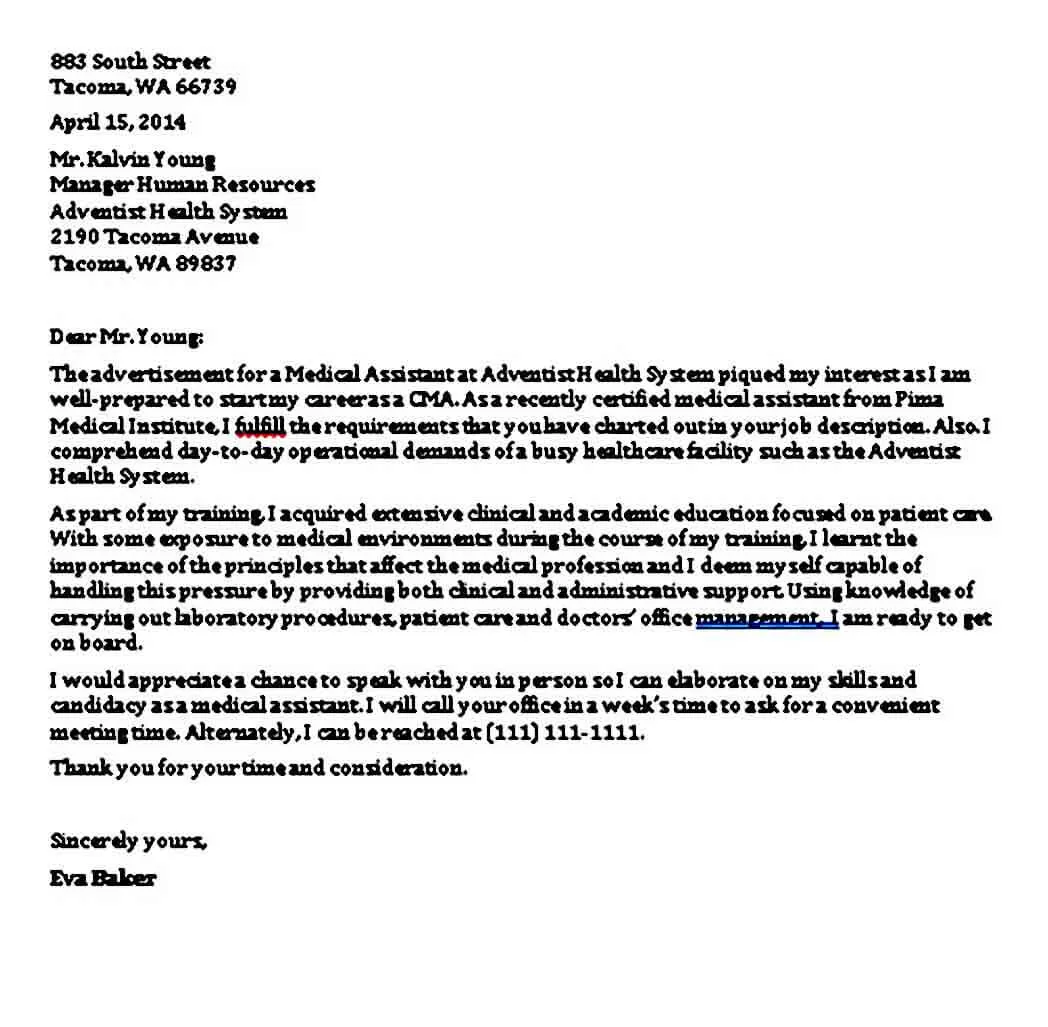
When you lack direct experience, focusing on your transferable skills becomes paramount. These are the skills you’ve developed in other settings, such as volunteer work, internships, educational projects, or previous jobs, that are relevant to the medical assistant role. Think about skills like communication, organization, attention to detail, problem-solving, and teamwork. For example, if you’ve volunteered at a community center, you can highlight your experience in interacting with diverse individuals, providing assistance, and maintaining a positive attitude under pressure. Similarly, if you’ve excelled in a customer service role, emphasize your ability to handle sensitive situations, communicate effectively, and prioritize tasks. These skills are highly valued in healthcare, and demonstrating how you’ve utilized them in the past will help you bridge the experience gap.
What Skills are Important for Medical Assistant?
Medical assistants require a diverse set of skills to excel in their roles. These include clinical skills such as taking patient histories, measuring vital signs, assisting with examinations, and administering medications. Additionally, they need strong administrative skills for scheduling appointments, managing medical records, and handling insurance paperwork. Communication skills are essential for interacting with patients, physicians, and other healthcare professionals. Empathy, compassion, and the ability to provide emotional support are also crucial. Furthermore, medical assistants must possess organizational skills, attention to detail, and the ability to multitask effectively in a fast-paced environment. Proficiency in medical software and electronic health records (EHR) systems is increasingly important, and a willingness to learn and adapt to new technologies is highly valued. Highlighting your understanding and potential in these areas will resonate well with prospective employers.
Soft Skills vs Hard Skills
Both soft and hard skills are important for medical assistants. Hard skills are the technical, job-specific abilities required to perform tasks, such as taking vital signs, administering injections, or using medical software. You may gain these through formal education, training programs, or on-the-job experience. Soft skills, on the other hand, are the interpersonal and personal attributes that enable you to interact effectively with others and succeed in the workplace. These include communication, empathy, teamwork, problem-solving, and time management. While hard skills are essential for performing the duties of a medical assistant, soft skills are equally important for building relationships with patients, collaborating with colleagues, and creating a positive work environment. In your cover letter, make sure to highlight both types of skills, emphasizing how your soft skills will contribute to your success in the role.
Education and Certifications
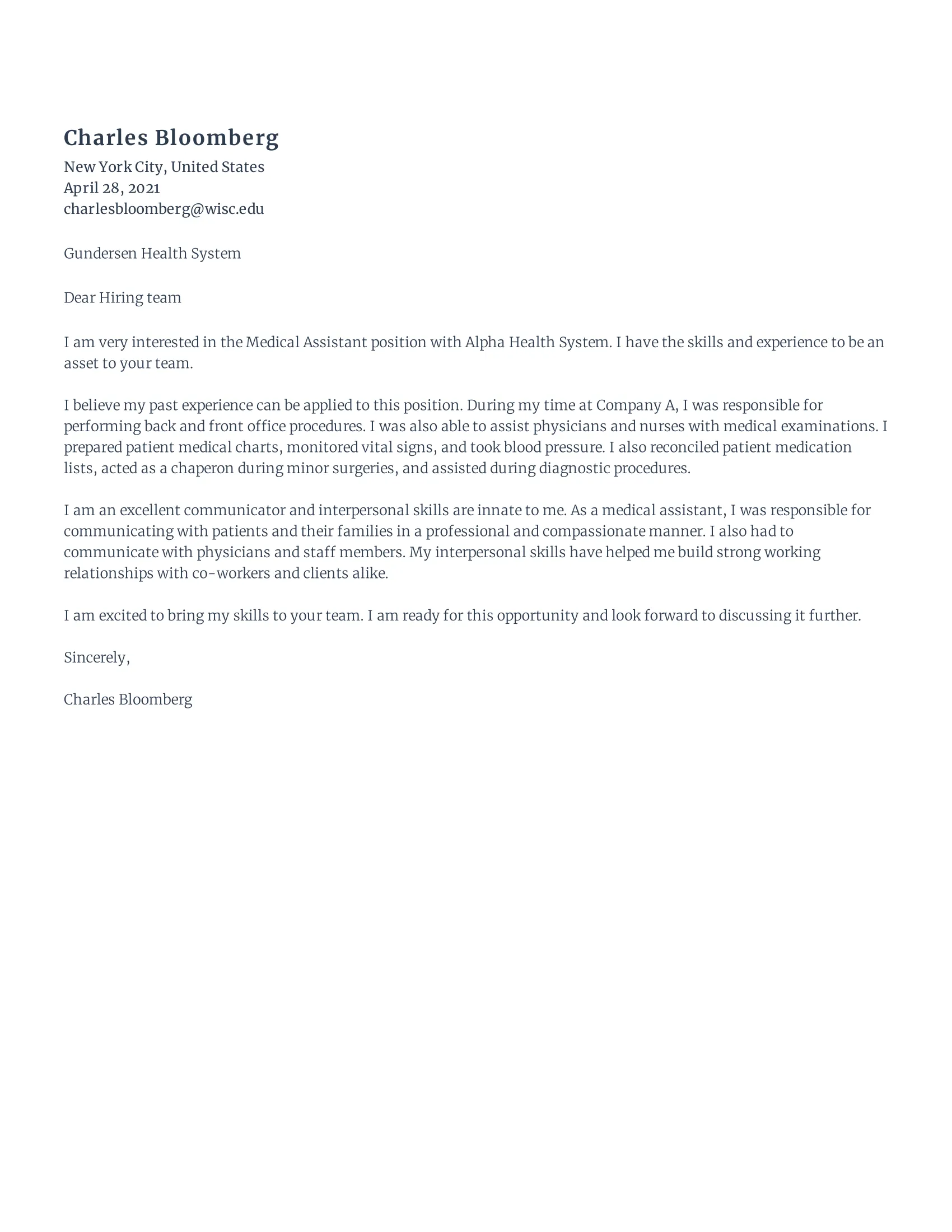
Even without direct experience, having relevant education and certifications can significantly strengthen your application. Many employers prefer candidates who have completed a medical assisting program from an accredited institution. These programs provide you with the fundamental knowledge and skills required for the role, including medical terminology, anatomy, physiology, and clinical procedures. Certification, such as Certified Medical Assistant (CMA) or Registered Medical Assistant (RMA), demonstrates your competence and commitment to the profession. List any certifications you hold and mention any programs you’re currently enrolled in or plan to enroll in. If you’re considering a program, research accredited schools and consider the curriculum and hands-on training opportunities they offer. Highlighting your educational background and certifications will show potential employers that you are serious about your career and have the foundation needed to succeed as a medical assistant. These make you stand out as a strong candidate, even with no professional experience.
Mentioning Relevant Courses
If you’ve completed relevant coursework, be sure to mention it in your cover letter. This is especially important if you are a recent graduate or have limited work experience. Highlight any courses that are directly applicable to the medical assistant role, such as medical terminology, anatomy and physiology, pharmacology, or clinical procedures. Describe the skills you gained and the projects you completed in these courses. For example, if you took a course on medical office management, you could mention your understanding of appointment scheduling, medical billing, and patient communication. By mentioning these courses, you can show your knowledge of the core concepts and your willingness to learn on the job. Doing this will help you show your level of preparedness and can create a strong impression, demonstrating your enthusiasm for the role and your commitment to your education.
Tailoring Your Cover Letter
A generic cover letter is unlikely to impress a potential employer. Tailoring your cover letter to each specific job application is essential. This involves researching the clinic or practice, understanding their needs, and demonstrating how your skills and experience align with their requirements. Review the job description carefully and identify the key qualifications and responsibilities. Then, tailor your cover letter to address these points specifically. Highlight the skills and experiences that are most relevant to the position and use the keywords from the job description. Explain why you are interested in working for that particular clinic or practice, and what you can bring to the team. Personalize your cover letter by mentioning specific aspects of the job or the organization that appeal to you. This level of personalization shows that you’ve taken the time to understand the opportunity and are genuinely interested in the role. By tailoring your cover letter, you increase your chances of making a strong impression and getting an interview.
Researching the Clinic or Practice
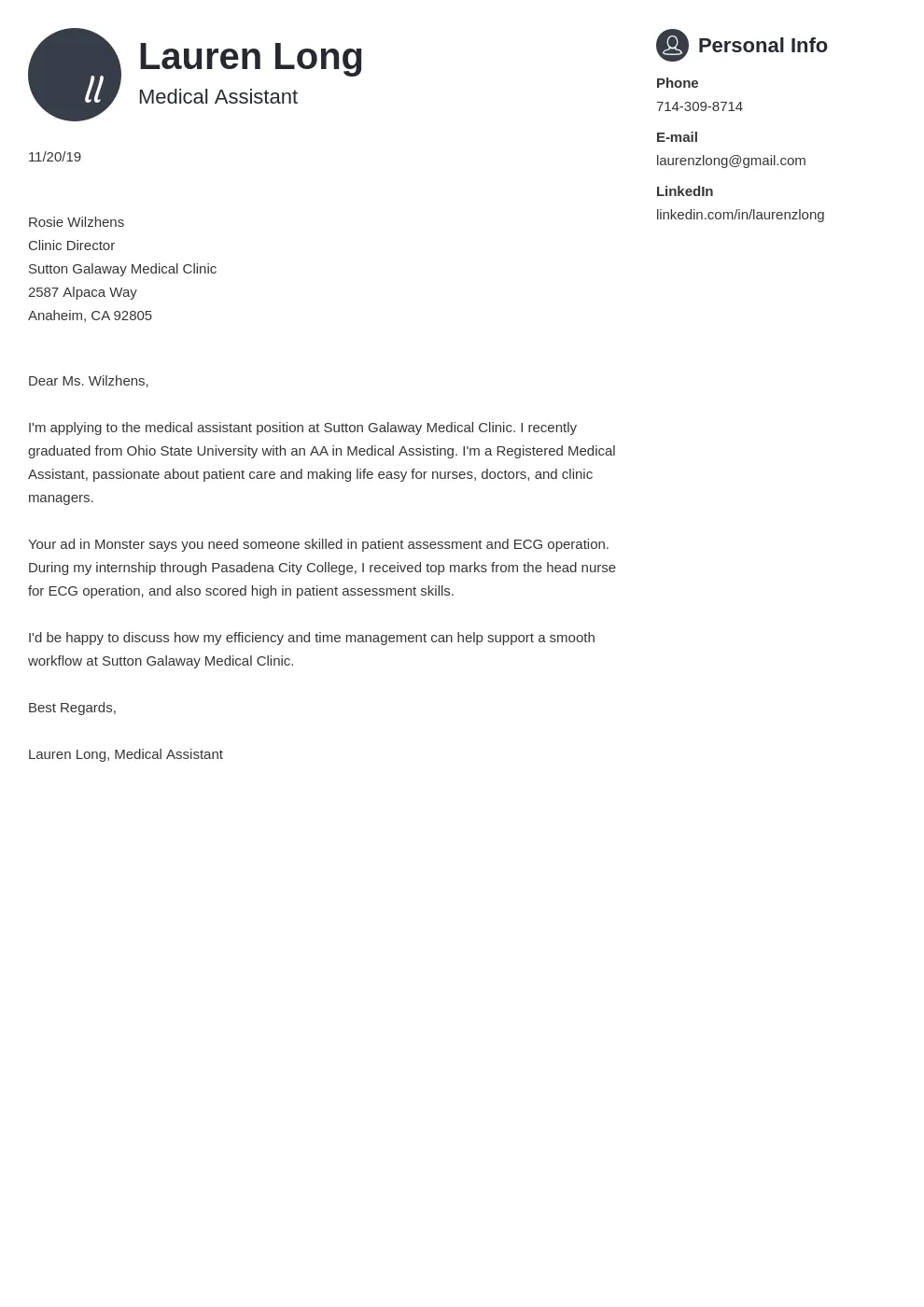
Before submitting your cover letter, take the time to research the clinic or practice where you’re applying. Visit their website, read online reviews, and look at their social media presence. Learn about their mission, values, and the services they offer. This will help you understand their specific needs and demonstrate your genuine interest in the organization. In your cover letter, you can mention something specific that caught your attention, such as their focus on patient care or their commitment to using the latest technology. This demonstrates your initiative and shows the hiring manager that you’ve done your homework. Understanding the clinic’s or practice’s culture and values will also help you determine if it’s a good fit for you. If possible, try to find out the name of the hiring manager and address your cover letter to them directly. This shows you’re making an effort and adds a personal touch to your application.
Using Keywords Effectively
Keywords are words and phrases that employers use to describe the skills, qualifications, and responsibilities of a job. Incorporating relevant keywords into your cover letter can help your application get noticed, especially if the employer uses an applicant tracking system (ATS) to screen applications. Carefully review the job description and identify the key keywords. These might include specific medical procedures, software programs, or soft skills. Weave these keywords naturally into your cover letter. For example, if the job description mentions ‘patient communication’ as a key skill, use this phrase or similar ones like ’effective communication with patients’ throughout your letter. However, avoid keyword stuffing, which is the overuse of keywords. Instead, focus on writing a clear, concise, and engaging cover letter that highlights your qualifications in a natural way. Using keywords appropriately will help you demonstrate your relevance to the position and increase your chances of getting an interview.
Formatting Your Cover Letter
The formatting of your cover letter is just as important as the content. A well-formatted cover letter is easy to read, professional-looking, and demonstrates your attention to detail. Choose a clean, simple font, such as Arial, Times New Roman, or Calibri, and use a font size between 10 and 12 points. Use one-inch margins on all sides of the document. Align your text to the left, and avoid using justified alignment, as this can make the text harder to read. Use single-spacing within paragraphs and double-spacing between paragraphs. Break up large blocks of text with headings and subheadings to make your cover letter more visually appealing. Proofread your cover letter carefully for any errors in grammar or spelling. Pay attention to the overall layout and ensure that it is consistent and professional. A well-formatted cover letter will make a positive impression and demonstrate that you are organized and detail-oriented.
Choosing the Right Font and Size
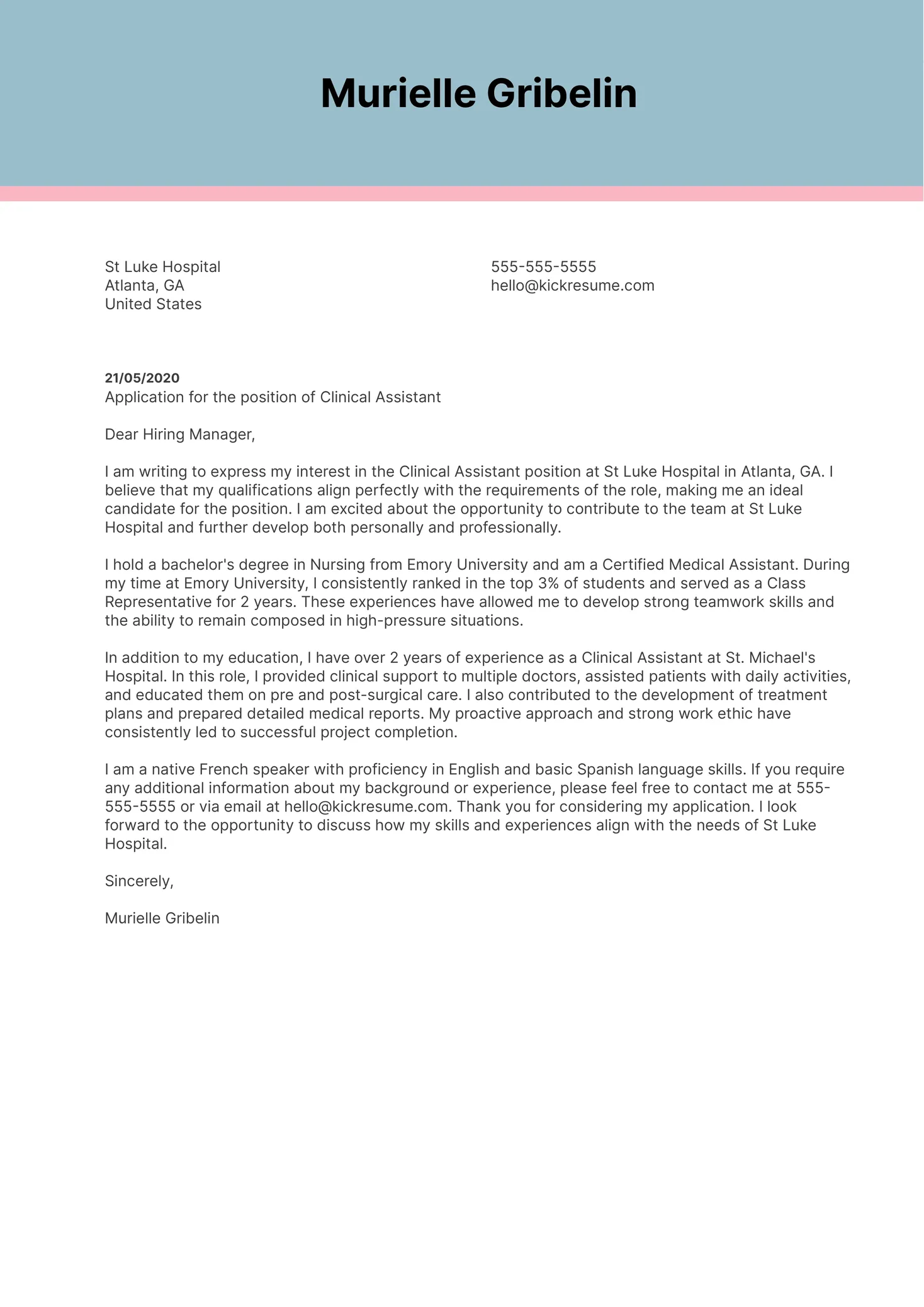
Selecting the right font and size is a crucial step in formatting your cover letter. The goal is to create a document that is both readable and professional. Choose a font that is easy to read, such as Times New Roman, Arial, Calibri, or Helvetica. Avoid using fancy or overly stylized fonts, as they can be distracting. The font size should be between 10 and 12 points. This ensures that the text is large enough to be easily read without being overwhelming. Stick to a consistent font and size throughout your cover letter. For headings, you can use a slightly larger font size or bold text to make them stand out. Be consistent with your font choices. If you are unsure which font to choose, opt for a simple, classic font like Times New Roman or Arial. These fonts are widely accepted and considered professional. Remember that the overall appearance of your cover letter will reflect on your attention to detail and professionalism.
Structuring Your Cover Letter
A well-structured cover letter is easier to read and helps you convey your message effectively. Follow a standard format for your cover letter. This usually includes a header with your contact information, a salutation, an opening paragraph, body paragraphs, a closing paragraph, and a closing signature. The header should include your name, address, phone number, and email address. Make sure your contact information is accurate and up-to-date. The salutation should address the hiring manager by name if possible. Research the clinic to find out the hiring manager’s name and use it, otherwise, use a general greeting like ‘Dear Hiring Manager’. The opening paragraph should state the position you are applying for and how you learned about the opportunity. The body paragraphs should highlight your qualifications and skills, focusing on your transferable skills and demonstrating your enthusiasm for the role. The closing paragraph should reiterate your interest in the position and express your gratitude for the opportunity. Conclude with a professional closing such as ‘Sincerely’ or ‘Best regards’, followed by your typed name. A well-structured cover letter will help you present your qualifications in a clear and concise manner.
The Header and Contact Information
The header of your cover letter is the first thing the hiring manager will see, so it’s important to make a good impression. Include your name, address, phone number, and email address at the top of the page. Make sure your contact information is accurate and up-to-date. This will help the hiring manager easily reach you if they want to schedule an interview. Use a professional email address. Avoid using nicknames or informal email addresses. If you don’t have a professional email address, create one specifically for your job search. Ensure the format is clean and easy to read. Consider using a simple font like Arial or Times New Roman. Place the header at the top left or center of the page. The header is a quick and easy way for the hiring manager to know who you are and how to contact you. It sets the tone for the rest of your cover letter, so make sure it is professional and polished.
The Opening Paragraph
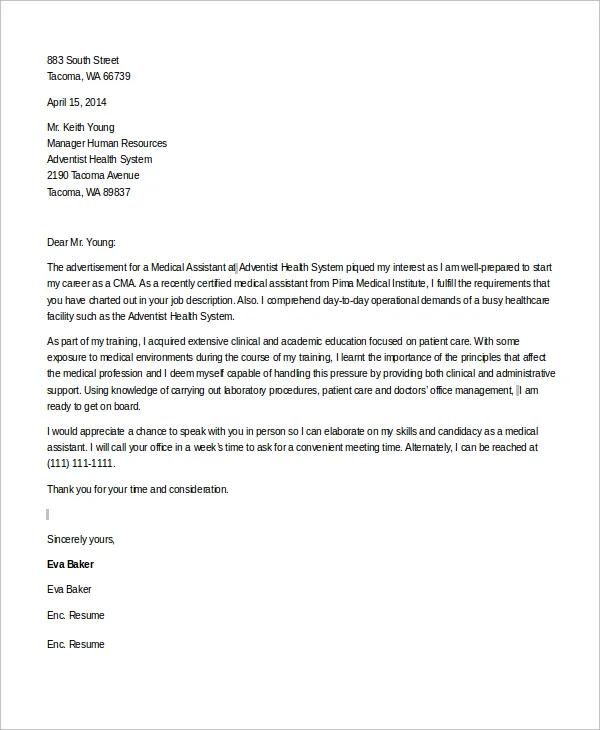
The opening paragraph of your cover letter should immediately grab the reader’s attention and make them want to continue reading. State the position you are applying for and how you learned about the opportunity. If you were referred by someone, mention their name. Show your enthusiasm for the role and the clinic or practice. Briefly mention your key qualifications and skills that align with the job description. Keep it concise and to the point. Avoid generic opening statements. Instead, personalize your opening paragraph by mentioning something specific that interests you about the position or the organization. For example, you could mention their commitment to patient care or their use of the latest technology. Your opening paragraph should be a strong introduction that grabs the reader’s attention and encourages them to learn more about your qualifications. This is your first chance to make a great impression, so make it count.
The Body Paragraphs
The body paragraphs are the heart of your cover letter, where you highlight your qualifications, skills, and experiences. Focus on showcasing your transferable skills, even if you don’t have direct experience as a medical assistant. Provide specific examples of how you have utilized these skills in the past. Use the STAR method (Situation, Task, Action, Result) to provide detailed examples of your accomplishments. For each skill, describe a situation, the task you were assigned, the actions you took, and the results you achieved. Quantify your accomplishments whenever possible. For instance, instead of saying ‘Improved customer service,’ say ‘Increased customer satisfaction scores by 15%’. Show your understanding of the medical assistant role and explain why you are interested in the position. Use action verbs to make your writing more engaging. Avoid simply restating your resume. Instead, use the body paragraphs to expand on your experiences and demonstrate your personality and enthusiasm. Highlight how your skills and qualifications make you the ideal candidate, making sure your writing is professional and polished. By structuring your body paragraphs well, you can persuade the hiring manager that you are the best candidate for the job.
Highlighting Your Enthusiasm and Interest
Showing enthusiasm and interest in the medical assistant position is crucial. The hiring manager wants to see that you are truly passionate about the role and the opportunity to work at their clinic or practice. Demonstrate your passion by expressing your interest in patient care and the healthcare field. Mention specific aspects of the job or the organization that appeal to you. For example, you could mention their focus on a particular area of medicine or their commitment to providing excellent patient service. Show that you have researched the clinic or practice and understand their mission and values. Tailor your cover letter to reflect their culture and demonstrate how you align with their goals. Use positive and energetic language throughout your cover letter. Avoid generic statements. Instead, show your excitement for the opportunity by detailing why you are the right fit for the position. Your enthusiasm can make you stand out from other candidates and make a memorable impression. By combining enthusiasm with your qualifications, you’ll make a strong case that you’re the perfect match for the role.
Showcasing Your Skills and Abilities
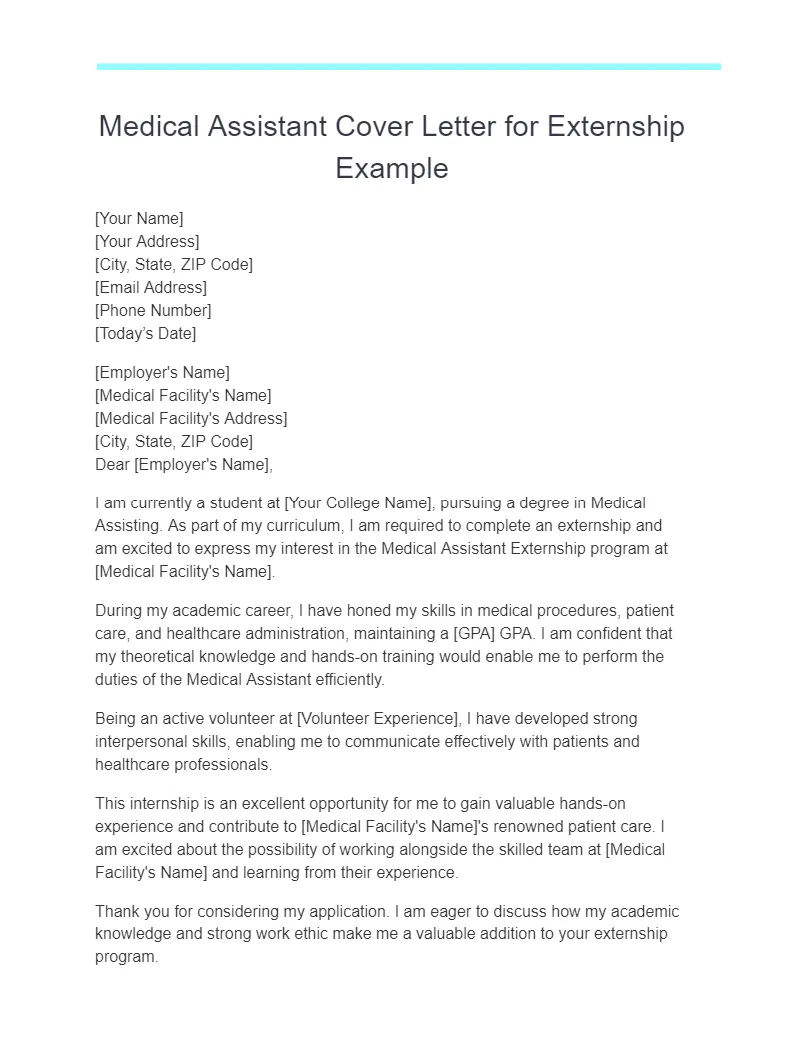
The body paragraphs of your cover letter are where you showcase your skills and abilities. Even without direct experience, you can demonstrate your potential by highlighting your transferable skills, education, and relevant experiences. Clearly state your skills in a way that aligns with the requirements of the job. Use action verbs to describe your accomplishments. Instead of simply listing your skills, provide specific examples of how you have utilized them in the past. Quantify your accomplishments whenever possible to make them more impactful. Emphasize your ability to learn quickly, adapt to new situations, and work effectively as part of a team. If you have any volunteer experience, internships, or relevant coursework, be sure to mention them. Describe the skills you gained and the responsibilities you held. Tailor your skills and abilities to the specific requirements of the job description. Use keywords from the job posting to demonstrate your relevance to the position. The goal is to convince the hiring manager that you have the necessary skills and abilities to succeed as a medical assistant, even without direct experience, creating a positive impression.
Addressing the Lack of Experience
It is crucial to address the lack of experience directly and positively. Acknowledge that you may not have direct experience as a medical assistant, but then shift the focus to your other qualifications. Frame the lack of experience as an opportunity to highlight your transferable skills, education, and enthusiasm for the role. Explain how your skills and experience from other areas are relevant to the medical assistant position. Emphasize your willingness to learn quickly and adapt to new situations. Highlight your strong work ethic, attention to detail, and organizational skills. Mention any relevant certifications, coursework, or volunteer experience. Demonstrate your passion for patient care and the healthcare field. Show that you are eager to gain experience and contribute to the success of the clinic or practice. Reassure the hiring manager that you are a quick learner and are committed to excelling in the role. By addressing the lack of experience in a positive and proactive way, you can alleviate any concerns the hiring manager might have and increase your chances of getting an interview.
Emphasizing your Willingness to Learn
Highlighting your willingness to learn is crucial when you have no prior experience. Emphasize your eagerness to learn new skills and expand your knowledge in the medical field. Show that you are proactive and willing to take on new challenges. Mention any specific areas of medical assisting that you are particularly interested in. Express your commitment to continuing education and professional development. Discuss your ability to quickly adapt to new situations and pick up new tasks. Highlight your strong work ethic and your commitment to providing excellent patient care. Mention any relevant courses or training programs you have completed or plan to complete. Demonstrate your understanding of the importance of teamwork and your willingness to collaborate with others. Reassure the hiring manager that you are a fast learner and are eager to contribute to the team’s success. Your willingness to learn will be a great impression on the hiring manager and can make you more appealing to them.
The Closing Paragraph
The closing paragraph should reiterate your interest in the position and leave a lasting positive impression on the hiring manager. Express your gratitude for the opportunity to be considered. Reiterate your enthusiasm for the role and the clinic or practice. Mention any key qualifications or skills that make you a good fit. Thank the hiring manager for their time and consideration. State your availability for an interview and provide your contact information again. Use a professional closing, such as ‘Sincerely’ or ‘Best regards’, followed by your typed name. Proofread the closing paragraph carefully to ensure it is free of any errors. The closing paragraph is your final chance to make a positive impression, so make sure it is concise, professional, and leaves the hiring manager with a positive impression of you. A strong closing can motivate the hiring manager to want to learn more about you and, ultimately, to offer you an interview.
Expressing Gratitude and Next Steps
In the closing paragraph, express your gratitude for the opportunity to be considered for the medical assistant position. Thank the hiring manager for their time and consideration. Show your appreciation for them taking the time to review your application. Reiterate your enthusiasm for the role and the clinic or practice. Mention any key qualifications or skills that you believe make you a good fit for the position. State your availability for an interview and provide your contact information again. Express your willingness to provide additional information or references if needed. Let the hiring manager know that you are eager to hear from them soon. Use a professional closing, such as ‘Sincerely’ or ‘Best regards’, followed by your typed name. Proofread the closing paragraph carefully to ensure it is free of any errors. Expressing gratitude will help you leave a positive lasting impression, showing the hiring manager that you value the opportunity and are a considerate candidate.
Proofreading and Editing
Proofreading and editing your cover letter is an essential step in the application process. Errors in grammar, spelling, and punctuation can create a negative impression and undermine your credibility. Carefully proofread your cover letter for any errors before submitting it. Check for typos, grammatical errors, and inconsistencies. Use a grammar and spell checker, but don’t rely on it completely. Read your cover letter aloud to catch any awkward phrasing or sentences. Ask a friend, family member, or career counselor to review your cover letter for feedback. Pay attention to the overall flow and clarity of your writing. Ensure that your message is clear, concise, and easy to understand. Edit your cover letter to eliminate any unnecessary words or phrases. Ensure that your cover letter is free of any errors. A polished cover letter shows that you pay attention to detail and take your job applications seriously, improving your chances of getting an interview.
Tips for a Polished Cover Letter
To create a polished cover letter, pay attention to detail, and be thorough throughout the entire process. Use a clean, professional font and format. Make sure your contact information is accurate and easy to read. Address the hiring manager by name. If you cannot find the name of the hiring manager, use a general greeting. Tailor your cover letter to each specific job application, highlighting the skills and experiences that are most relevant to the position. Research the clinic or practice, and demonstrate your understanding of their mission and values. Show enthusiasm for the role and the healthcare field. Use action verbs to describe your accomplishments and quantify them whenever possible. Focus on your transferable skills, even if you have no direct experience. Acknowledge the lack of experience and address it positively. Emphasize your willingness to learn and adapt. Proofread your cover letter carefully for any errors in grammar, spelling, and punctuation. Ask a friend, family member, or career counselor to review your cover letter for feedback. By following these tips, you can create a polished cover letter that makes a great impression and increases your chances of getting an interview.
Common Mistakes to Avoid
There are several common mistakes that can undermine your cover letter and hurt your chances of getting an interview. Avoid using generic language and templates. Instead, personalize your cover letter to each specific job application. Do not simply restate your resume. Use the cover letter to expand on your experiences and demonstrate your personality and enthusiasm. Avoid using overly informal language. Stick to a professional tone throughout your cover letter. Do not include negative comments about previous employers or experiences. Keep your focus on the positive aspects of your skills and qualifications. Avoid making any spelling or grammatical errors. Proofread your cover letter carefully before submitting it. Do not exceed the recommended length. Keep your cover letter to one page. Avoid being overly aggressive or demanding in your tone. Express your interest in a professional and respectful manner. Make sure your cover letter is error-free, well-written, and tailored to the specific job. Avoiding these common mistakes will significantly increase your chances of making a strong impression on the hiring manager.
Submitting Your Cover Letter
Submitting your cover letter correctly is important for making a good impression. Always follow the application instructions provided by the employer. If the instructions specify a certain file format, such as a PDF or Word document, use that format. If you are submitting your cover letter online, carefully review the instructions for uploading documents. Make sure your cover letter is properly formatted and free of any errors before submitting it. Double-check that your contact information is accurate and up-to-date. If you are submitting your cover letter via email, use a professional subject line. Attach your cover letter and resume to the email. In the body of the email, you can reiterate your interest in the position and thank the hiring manager for their consideration. Once you have submitted your cover letter, follow up with the employer if appropriate. If the application instructions do not mention how to follow up, you can send a brief email or call the hiring manager a week or two after submitting your application to reiterate your interest and ask about the status of your application. Submitting your cover letter correctly will increase your chances of getting noticed and moving forward in the application process.
Following Application Instructions
Following the application instructions provided by the employer is crucial. Failure to do so can result in your application being overlooked. Carefully read the job description and any accompanying instructions. Pay close attention to the required documents, file formats, and submission methods. If the instructions specify a particular format, such as a PDF or a specific font, use that format. Adhere to the specified word count or page limit. If the instructions ask you to address your cover letter to a specific person, make sure you do so. Follow the instructions for submitting your application, whether it is online or via email. Double-check your application for any errors before submitting it. By carefully following the application instructions, you will demonstrate your attention to detail, respect for the employer’s preferences, and commitment to the application process. This increases your chances of your application being reviewed and considered for an interview. When you follow instructions, you are showing respect for the company and making your application stand out in a positive way.
